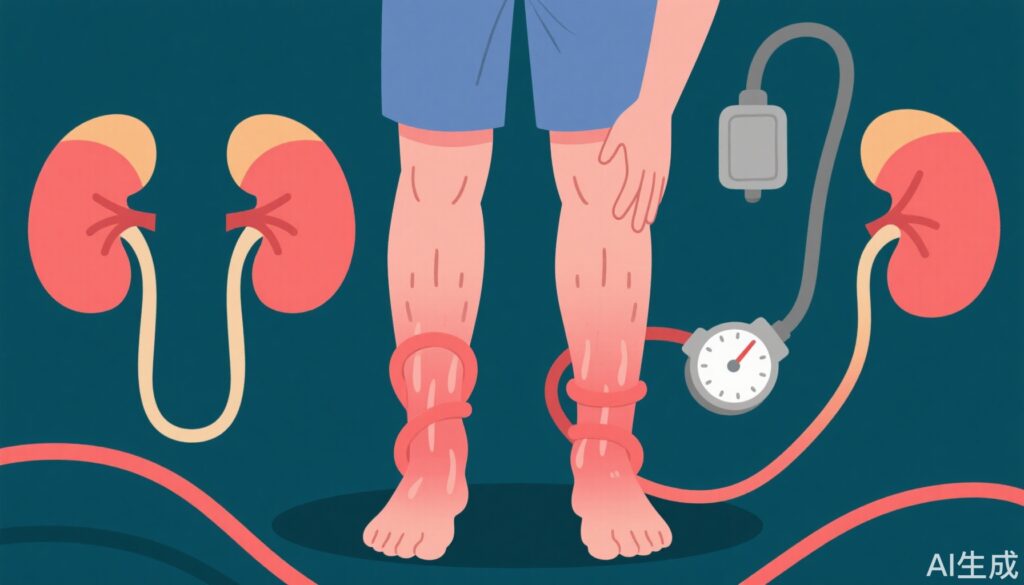Introduction
The kidneys are vital organs responsible for filtering waste and balancing fluids, yet they do not have pain receptors. This means kidney problems often develop silently without obvious pain, earning chronic kidney disease the nickname “the silent killer.” Early symptoms can be subtle and easily overlooked. However, recognizing certain signs can help detect kidney issues before serious damage occurs.
Four Key Signs Suggesting Kidney Disease
1. Edema (Swelling)
The kidneys regulate fluid balance. When kidney function declines, fluid can accumulate, causing swelling—especially noticeable in the face and limbs. Persistent or worsening edema should be taken seriously.
2. Elevated Blood Pressure
The cardiovascular system is akin to a water circulation network: the heart acts as a pump, sending blood throughout the body, while the kidneys manage blood volume and pressure by adjusting fluid levels. When kidneys fail to eliminate excess water, fluid retention increases blood pressure, potentially leading to hypertension.
3. Foamy Urine
Normal urine may have small bubbles that disappear quickly (usually within a minute). If foam is persistent, dense, and large in volume, lasting for several minutes, it may indicate excess protein in the urine—a sign of kidney damage.
4. Increased Nighttime Urination (Nocturia)
Healthy adults typically urinate once or not at all during the night. Frequent urination (over two times per night) or large nighttime urine volumes (exceeding 500 ml) sustained over several days should prompt medical evaluation. Conditions such as hypertensive kidney damage, chronic interstitial nephritis, drug-induced kidney injury, and other metabolic or immune-related kidney diseases can cause this symptom.
Additional symptoms like itchy skin, anemia, headaches, fatigue, memory decline, poor sleep, and loss of appetite may also indicate kidney dysfunction and warrant medical attention.
Important Kidney Function Indicators for Patients
1. Serum Creatinine
Serum creatinine is widely used to estimate kidney filtration function. However, significant changes usually appear only after the glomerular filtration rate (GFR) drops by nearly 50%. Serum creatinine levels are also influenced by factors such as gender, diet, and muscle mass.
2. Blood Urea Nitrogen (BUN)
When GFR falls below 40% of normal, BUN begins to rise gradually. The blood concentration of urea nitrogen depends on external factors like protein intake and internal factors such as infections, corticosteroid use, and gastrointestinal bleeding. The kidney tubules also reabsorb urea, making BUN a useful supplemental marker for assessing kidney function.
Protecting Your Kidneys: Practical Tips
1. Dietary Control
Excessive intake of high-protein foods in one sitting can stress the kidneys. Chronic overeating is detrimental. Emphasize vegetables and fiber-rich foods to avoid constipation and toxin buildup. Limit daily salt intake to under 5 grams. Avoid or minimize alcohol consumption and quit smoking promptly.
2. Monitor Urination
Pay attention to urine changes such as darkening color, foaming, or sudden increases in nighttime urination. If these occur, seek medical advice promptly.
3. Stay Hydrated
Drink sufficient water daily (1,500 to 1,700 ml for most adults), avoid holding urine. In hot weather or with increased physical activity, adjust intake accordingly. Those with heart or lung problems should follow their physician’s hydration recommendations.
4. Regular Health Check-ups
Annual health screenings are advisable. People with diabetes or hypertension are at higher risk of kidney disease and should monitor kidney function regularly, including urine protein and serum creatinine levels.
5. Adhere to Treatment
Do not stop medications when symptoms improve without medical guidance. Commonly prescribed drugs for kidney patients include antihypertensives, anemia treatments, and corticosteroids. These play crucial roles and should not be discontinued arbitrarily.
Who Should Be Extra Cautious About Kidney Damage?
– Individuals with hypertension, diabetes, or autoimmune diseases
– Overweight or obese persons
– Those with a history of long-term medication use
– People with prior kidney disease, hepatitis, or low birth weight due to premature birth
– Individuals with recurrent urinary tract infections
– Persons with unhealthy habits such as smoking, heavy drinking, or chronic sleep deprivation
Conclusion
Early recognition and proactive management of kidney-related symptoms are vital to preserving kidney health and preventing progression to advanced kidney disease. Lifestyle adjustments, regular monitoring, and adherence to medical treatment can make a significant difference in outcomes. If you notice any warning signs, consult a healthcare professional promptly to safeguard your kidneys.



